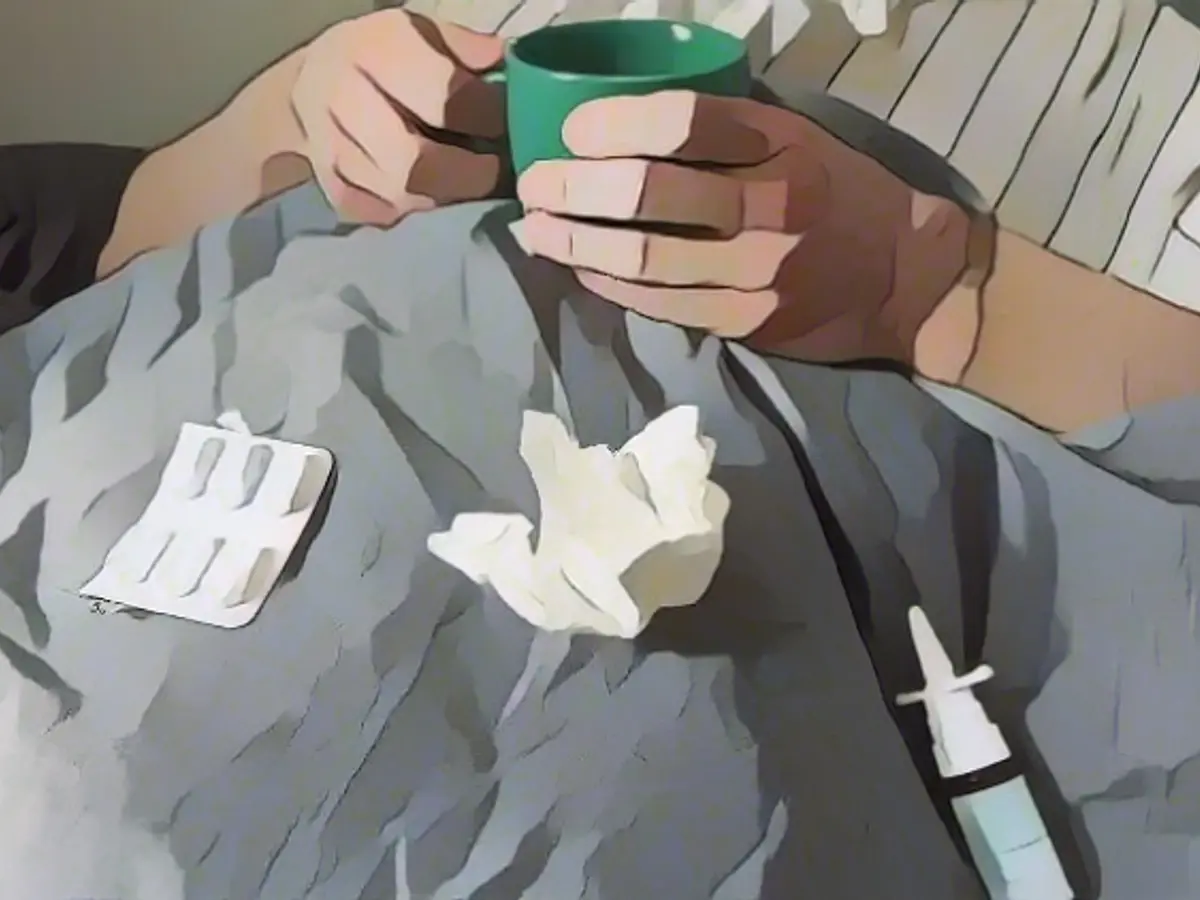Almost eight million Germans are ill
Sniffling and coughing into the holidays: according to the Robert Koch Institute, more and more people are catching acute respiratory infections. Corona and rhinoviruses are now being joined by RSV and influenza.
The pre-Christmas period in Germany is clouded by a further increase in the number of infections with acute respiratory diseases. Corona, colds and flu are still or increasingly on the rise, according to data from the Robert Koch Institute (RKI ). The report on the situation in the week up to December 10 estimates around 7.9 million acute respiratory illnesses (previous report: 7.1 million) nationwide, regardless of visits to the doctor. After corona in particular has dominated for some time, the RKI recently announced the start of the RSV wave (RSV stands for respiratory syncytial virus infections). Now flu cases are also increasing significantly.
However, according to the RKI definition, the flu wave triggered by influenza viruses has not yet begun. "Influenza cases have so far mainly affected school-age children and young adults," the report states. The number of reports, i.e. laboratory-confirmed cases of influenza, is still relatively low nationwide at around 1,400 for the previous week. However, it has more than doubled compared to the previous week. Corona is being detected much more frequently in this country: Around 26,850 cases were reported for the past week. The reporting figures for both diseases should be seen as the tip of the iceberg.
Corona means: one additional pathogen
Overall, the RKI estimates that 9500 per 100,000 inhabitants had an acute respiratory illness last week (previous week's report: around 8500). A year ago at this time, the rate was even higher - in several of the previous years it was lower, but this is probably partly due to the corona measures in place at the time. In any case, the development of respiratory diseases can vary considerably from season to season.
According to experts, a small catch-up effect could still play a role in the current high levels: This means that just possibly a little more people are becoming infected with pathogens that they did not come into contact with in the pandemic years, or came into contact with less frequently than usual.
"But of course you also have to bear in mind that we now have one more pathogen for respiratory diseases," said Dortmund immunologist Carsten Watzl. If you look at the relatively high proportion of Sars-CoV-2 in all respiratory infections at the moment, it is no wonder that the overall incidence is higher than in the years before the pandemic.
"We can also assume a higher level of awareness among the population," said Bremen epidemiologist Hajo Zeeb. And thus also a tendency towards more visits to the doctor for respiratory illnesses, which could also be reflected in the statistics and the number of people unable to work.
Watzl vehemently refutes claims that the hygiene measures during the pandemic could have damaged the immune system. This is simply not true. "I don't have to train my immune system through infections for it to be active in the first place." The fact that infections that were avoided back then are now being made up for does not mean that the immune system has been weakened.
Severe coronavirus cases are not history
Despite basic immunity through vaccinations and infections in the population, severe cases are not completely a thing of the past. A corona infection can still make you "quite ill", said Charité expert Leif Sander recently on Rundfunk Berlin-Brandenburg (RBB). "Even the kind of manifestations we saw a few years ago." Reasons could be, for example, a vaccination that took place a long time ago or no good immunization. He therefore considers a certain degree of caution to be advisable: Voluntarily wearing a mask in a very crowded subway, for example, is sensible - also to protect against other viruses.
The coronavirus warnings issued by Federal Health Minister Karl Lauterbach in recent days were followed on Wednesday by criticism from Andreas Gassen, head of the panel of statutory health insurance physicians. "I think the urgency of his warnings and appeals is excessive. After all, we no longer have a pandemic situation," Gassen told the Rheinische Post newspaper. In the past, people weren't advised to wear masks everywhere and avoid indoor Christmas parties because of colds or the flu. "What makes sense is the vaccination against coronavirus and influenza for all older people and risk groups," said Gassen.
Read also:
- This will change in December
- German activists speak out in Dubai on suffering in Israel and the Gaza Strip
- Despite UN vote: fighting between Israel and Hamas in the Gaza Strip continues
- Nuclear fusion - hype or solution to energy problems?
- Amidst the rising cases of acute respiratory infections, including Coronaviruses, flu, and colds, politicians and health experts like Karl Lauterbach are advocating for continued precautions and vaccinations.
- The Robert Koch Institute's data reveals that not only Coronaviruses and colds are on the rise, but also flu, with RSV and influenza contributing to the rise in respiratory diseases during the pre-Christmas period.
- Germany's Ministry of Health has faced criticism from health insurance physicians for exaggerating Coronavirus warnings, as the current situation more closely resembles seasonal flu or colds, with flu cases still below the threshold for triggering a wave according to the RKI.
Source: www.ntv.de







